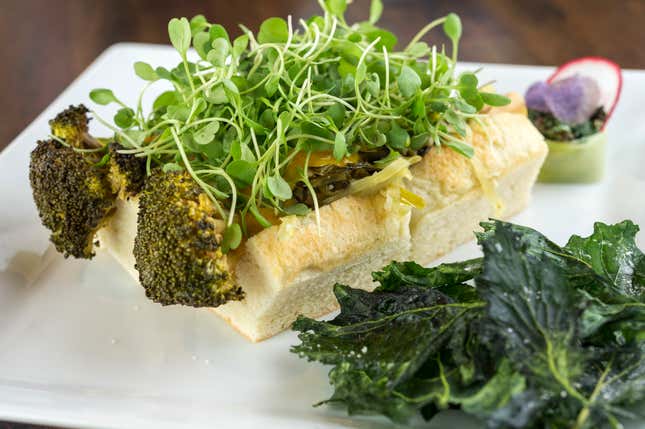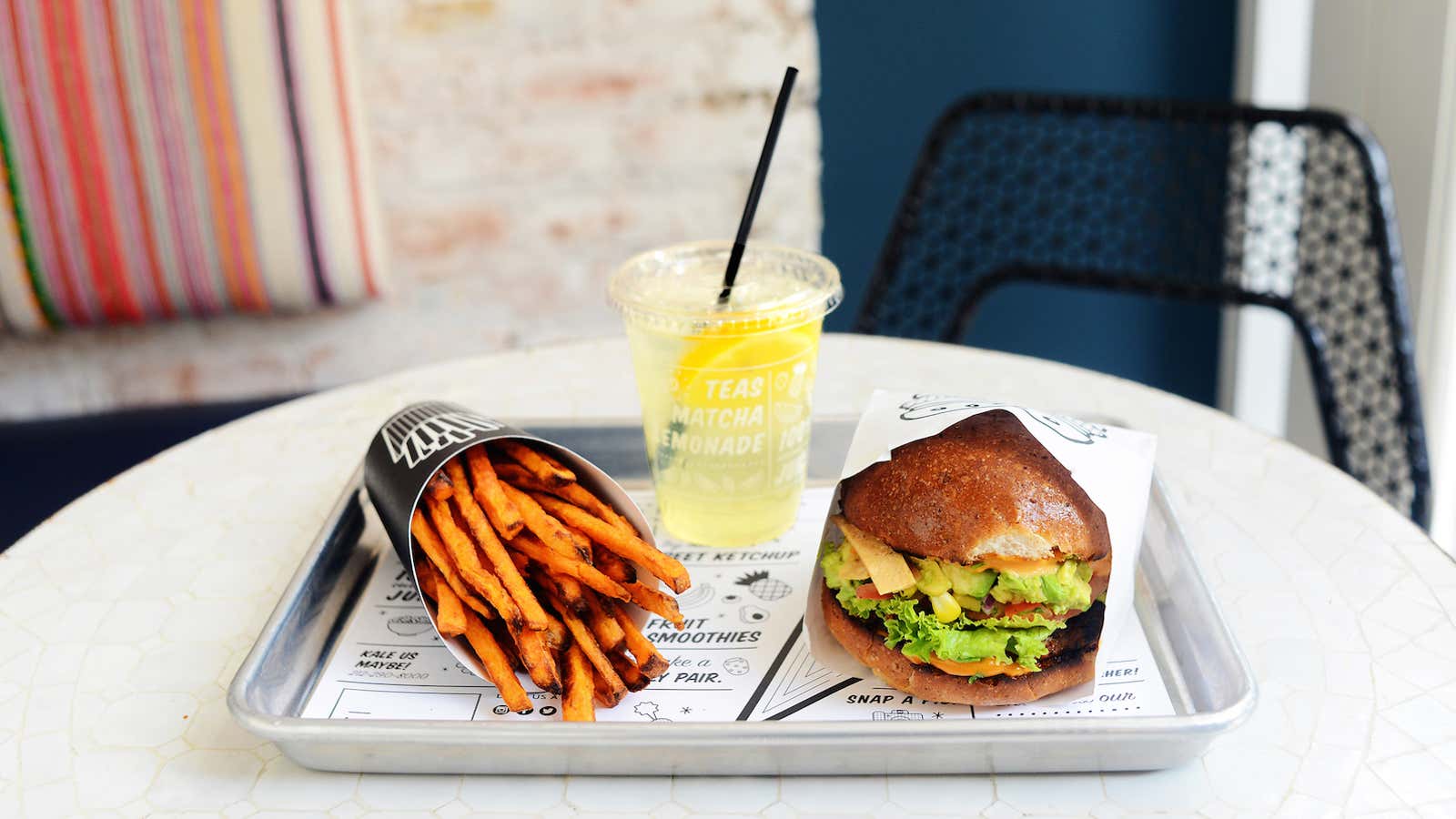New York City’s hottest vegan restaurant is owned by a steakhouse chain.
With burgers and a meatball sub on the menu, first-time diners may do a double take when they learn there’s no meat at By Chloe. And that’s exactly what chef Chloe Coscarelli wants.
The restaurant, which opened in July, is backed by Esquared Hospitality, the company behind the BLT restaurant brand, which added “vegetable steaks” to their menus this year. By Chloe is opening a second location in New York due to the popularity of its hearty—but healthy—menu. Coscarelli has effectively cracked the code that’s kept vegan restaurants from tapping into the general market, even as interest in healthy food and sustainability has grown in recent years.
“They specialize in steak,” Coscarelli said of Esquared, “but to be able to bring their reach and knowledge to run By Chloe well worked out for everybody.”
That’s because Coscarelli’s mission isn’t “save the animals”—it’s to get people who want to eat good food into her restaurant. Working around misconceptions about vegetables and meatless food is not unique to By Chloe—it’s the primary challenge of the growing vegetable-based restaurant industry.
Main Street American
Though it’s easier than ever to be meat-free, only about 5% of the US population consistently eats a vegetarian diet—a figure that has remained constant over the past 10 years. That’s because “vegetarian” and “vegan” tend to connote giving up something (read: meat), according to Coscarelli, who is adamant that being vegan shouldn’t mean eating salads at every meal.
“What was missing was a place I could take my guy friends,” Coscarelli said.
Along with burgers and subs, there’s mac and cheese and sweet potato fries on the menu at By Chloe, which she created to be totally accessible to non-vegans. The burgers, made with bean and grain patties, even come in paper wrappers, like fast food. Coscarelli is disguising her vegetables as comfort food in order to tap into the same market as BLT (i.e. the average American).
“The goal was to make the food photograph well,” Creative Director of Esquared and By Chloe Samantha Wasser said.
That’s because, when it comes to vegetable-based dishes, what customers see is more important than what they get. There’s a widespread perception among omnivorous diners that vegetable-based dishes are not filling, Coscarelli said. So she made her food a feast for the eyes, as well as the stomach.
And it’s working.
On a Tuesday night in August, the line reached from the service counter to the back door—about 30 feet—as a mix of men and women of all ages lined up to treat themselves to an indulgent meal.
“We expected the vegans to come, but this is so much more,” Coscarelli said. “We don’t know where they’re coming from. But we’re so glad they’re here.”
Meaty misconceptions
Being explicit about the political ideology behind meatless food can work against a restaurant’s general appeal.
No one understands this as well as Amanda Cohen, head chef and owner of concept-driven restaurant Dirt Candy, a perennial favorite among New York City food critics, which reopened in a new location in February.
Cohen—who told Quartz, “I don’t like meat, that’s why I don’t serve it”—is adamant about referring to her meatless menu as “vegetable-focused,” rather than “vegetarian.”
“Vegetarian seems like a niche,” Cohen said. “It seems like a lifestyle.”
Instead of appealing to an eco-minded audience, Cohen and Coscarelli both made their goal to reach as many diners as possible, distancing themselves from the asceticism most people associate with vegetarianism and veganism.
“People come to us expecting a healthier meal, but that’s not our goal,” Cohen, who uses cheese and milk in her dishes, said. “Meat and bacon exploded in the early 2000s. Now, people are taking a step back from that and thinking ‘maybe I can have a vegetable or two with my meal.’”

Cohen’s food comes with a higher price tag than Coscarelli’s: a meal at Dirt Candy will run about $50 per person compared to somewhere between $15 and $20—depending on your appetite—at By Chloe. But Cohen’s been able to pull it off for 10 years and counting by consistently surprising and delighting customers with her technically advanced creations. Signature dishes are named after the primary vegetable in them, such as “Tomato,” a small circle of smoked feta wrapped in ”tomato leather,” and “Broccoli,” Cohen’s take on the hot dog, which is made of a stalk of broccoli that is smoked, seasoned and served on a bun.
Sustainably trendy
Both Cohen and Coscarelli went to the Natural Gourmet Institute in New York City, which teaches vegetable-focused cooking at the gourmet level.
According to Sydney Schwarz, the head of admissions and advancement at the school, the current interest in supply-driven dishes made from local ingredients is a reaction to realities uncovered by the media.
“People are more aware of where their food comes from today,” she said, noting that consumers’ growing awareness of the food supply-chain is contributing to a shift across the entire restaurant industry.
“More chefs are using alternative distribution, and people are getting comfortable with paying good money for vegetable-based food,” she said, citing vegetable tasting menus at Per Se and Blue Hill, which ring in at $310 and $88, respectively.
By Chloe is strategically placed to capitalize on this trend.
Schwarz characterizes By Chloe and other successful vegetable-based fast-casual concepts, like Dig Inn, as “gateway drugs,” that are helping to change the perception of vegetables as boring and tasteless, while subtly encouraging eco-friendly decisions, at the mid-priced level.
Now-familiar terms like “locally-sourced” and “all natural” show up on By Chloe’s website, and the restaurant’s official motto reads: “Eat Well. Eat with purpose.”
Taking a cue from other non-vegan chains with a focus on sustainability—like Panera and Chipotle, for example—Coscarelli places “well” before “purpose,” emphasizing the importance of feeling personally satisfied first, and morally validated second.
By striking the right balance between the two qualities that characterize the growing sustainability trend—which, as Schwarz points out, stems from environmental and health concerns that are here to stay—By Chloe has secured its place in the general market and pointed the way for vegetable-focused restaurants to come.
In the future, expect to have your (vegan) cake and eat it too.
